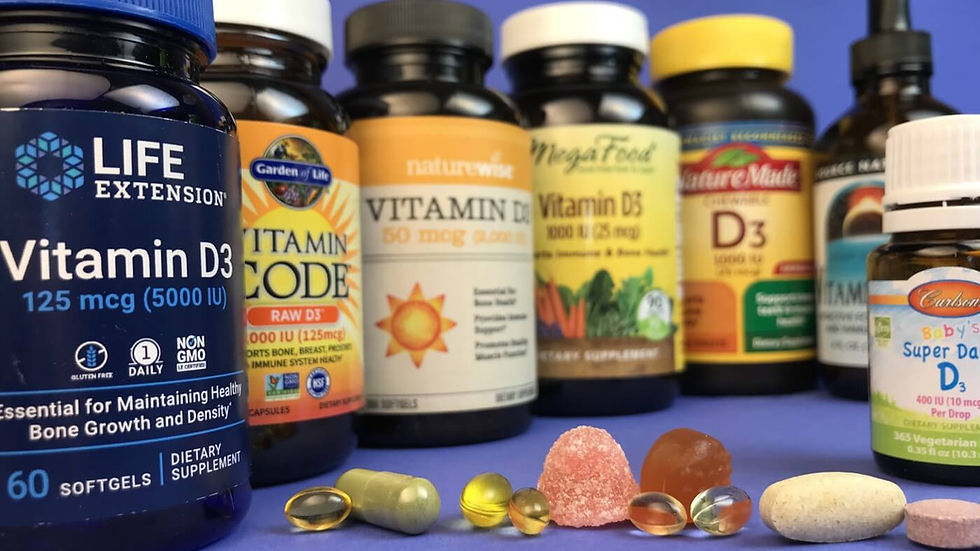Why do a Food Intolerance Test?
- Jody Chalifoux IFBB PRO

- Feb 22, 2023
- 5 min read
Updated: Feb 22, 2023
Food intolerance testing can be helpful for a variety of reasons. Here are a few possible reasons why someone might consider food intolerance testing:
Identify trigger foods: Some people have symptoms such as bloating, gas, diarrhea, headaches, or fatigue after eating certain foods. Food intolerance testing can help identify which foods may be triggering these symptoms.
Improve overall health: By identifying and eliminating trigger foods, some people may experience improved overall health and well-being. They may have more energy, better digestion, and fewer symptoms overall.
Manage chronic conditions: Some chronic conditions, such as irritable bowel syndrome (IBS), may be aggravated by certain foods. By identifying and eliminating these trigger foods, people with chronic conditions may be better able to manage their symptoms.
Support weight loss: For some people, food intolerances may contribute to weight gain or difficulty losing weight. By identifying and eliminating trigger foods, they may be able to lose weight more easily or maintain a healthy weight.
It's important to note that not all food intolerance testing methods are scientifically validated or reliable, and some may even be considered controversial. If you're considering food intolerance testing, it's a good idea to talk to your healthcare provider to determine if it's a good option for you and to identify a reputable testing method.

Should I get help after I get the Food Intolerance Test done?
Yes, it's a good idea to seek professional help after getting a food intolerance test done. While food intolerance testing can provide helpful information about which foods may be triggering symptoms, it's important to work with a healthcare provider or registered dietitian to interpret the results and develop a plan for managing your symptoms.
Here are a few reasons why seeking professional help can be beneficial:
Interpretation of test results: A healthcare provider or registered dietitian can help you understand what your test results mean and how to interpret them. They can also help you identify any limitations or potential inaccuracies associated with the test.
Personalized dietary recommendations: Based on your test results and other factors such as your medical history and lifestyle, a healthcare provider or registered dietitian can develop personalized dietary recommendations to help manage your symptoms.
Monitoring and follow-up: A healthcare provider or registered dietitian can monitor your progress and make adjustments to your dietary plan as needed. They can also provide ongoing support and guidance to help you stick with your plan and achieve your goals.
Integration with other treatments: If you have a medical condition that's contributing to your symptoms, a healthcare provider can help integrate your dietary plan with other treatments you may be receiving.
In summary, while food intolerance testing can be a helpful tool, it's important to seek professional help to interpret the results and develop a plan for managing your symptoms. A healthcare provider or dietitian can provide personalized recommendations and ongoing support to help you achieve your goals.
Is a Blood Test more accurate than a Food Intolerance Test?
It's difficult to say whether a food intolerance test or a blood test is more accurate, as there are many different types of tests available and the accuracy can vary depending on the specific test and the individual being tested.
Here are a few points to consider when comparing food intolerance tests and blood tests:
Types of tests: Food intolerance tests and blood tests are different types of tests that measure different things. Food intolerance tests typically measure antibodies, immune reactions, or other markers that are associated with food intolerances or sensitivities. Blood tests, on the other hand, can measure a wide range of things, including nutrient levels, hormone levels, and markers of inflammation or disease.
Reliability and validity: The reliability and validity of a test depend on many factors, including the specific test being used, the quality of the laboratory performing the test, and the individual being tested. Some food intolerance tests have been found to have low reliability and validity, while others have shown promising results in research studies. Similarly, blood tests can vary widely in reliability and validity depending on the specific test and the individual being tested. Currently the food intolerance machines have come a long way with technology proving them to be very accurate.
Interpretation: Both food intolerance tests and blood tests require interpretation by a healthcare provider or dietitian. The results of these tests can be complex and may need to be considered in the context of other factors, such as medical history and lifestyle.
In summary, it's difficult to compare the accuracy of food intolerance tests and blood tests as there are many different factors to consider. If you're considering testing for a food intolerance, it's important to talk to your healthcare provider to determine which test may be appropriate for you and to interpret the results accurately.
Having a good doctor!
Having a good doctor can make a significant difference in your overall health and well-being. Here are a few reasons why having a good doctor is important:
Expertise and knowledge: A good doctor has the expertise and knowledge to diagnose and treat a wide range of health conditions. They stay up-to-date with the latest research and medical advancements to provide the best possible care.
Trust and rapport: A good doctor establishes a trusting and supportive relationship with their patients. They listen to their patients' concerns, answer questions, and provide compassionate care.
Personalized care: A good doctor recognizes that each patient is unique and provides personalized care based on their individual needs and preferences. They work with their patients to develop a treatment plan that aligns with their goals and values.
Coordination of care: A good doctor works with other healthcare providers and specialists to coordinate care for their patients. They ensure that their patients receive the appropriate tests, treatments, and follow-up care needed to manage their health conditions effectively.
Health promotion and disease prevention: A good doctor emphasizes health promotion and disease prevention to help their patients maintain optimal health. They provide guidance on healthy lifestyle habits, such as diet and exercise, and offer screening tests and vaccinations to prevent or detect health problems early.
In summary, having a good doctor is essential for receiving high-quality healthcare that is personalized, supportive, and effective. A good doctor provides expertise, trust, personalized care, coordination of care, and guidance for health promotion and disease prevention.
What do I do if I don't have a good doctor?
If you don't have a good doctor or if you're not satisfied with the care you're receiving, there are several steps you can take to find a new doctor and get the care you need:
Ask for recommendations: Ask family members, friends, or coworkers if they can recommend a good doctor. You can also check online reviews or ratings of doctors in your area.
Check with your insurance provider: If you have health insurance, check with your insurance provider to see if they have a list of doctors in your network. This can help ensure that you receive coverage for your care.
Research potential doctors: Once you have a list of potential doctors, do some research to learn more about their education, training, and experience. You can also check their board certifications and any disciplinary actions or malpractice suits against them.
Schedule a consultation: Many doctors offer consultations or meet-and-greets to allow you to get to know them and ask questions about their approach to care. This can help you determine if they're a good fit for you.
Advocate for yourself: Once you find a new doctor, be sure to communicate your needs and concerns clearly. If you feel like your care is not meeting your needs, don't hesitate to speak up and advocate for yourself.
Remember, finding a good doctor can take some time and effort, but it's important to prioritize your health and wellbeing by seeking out the best possible care.







Comments